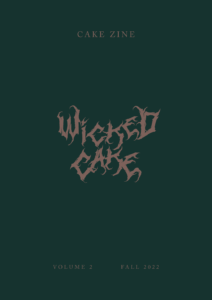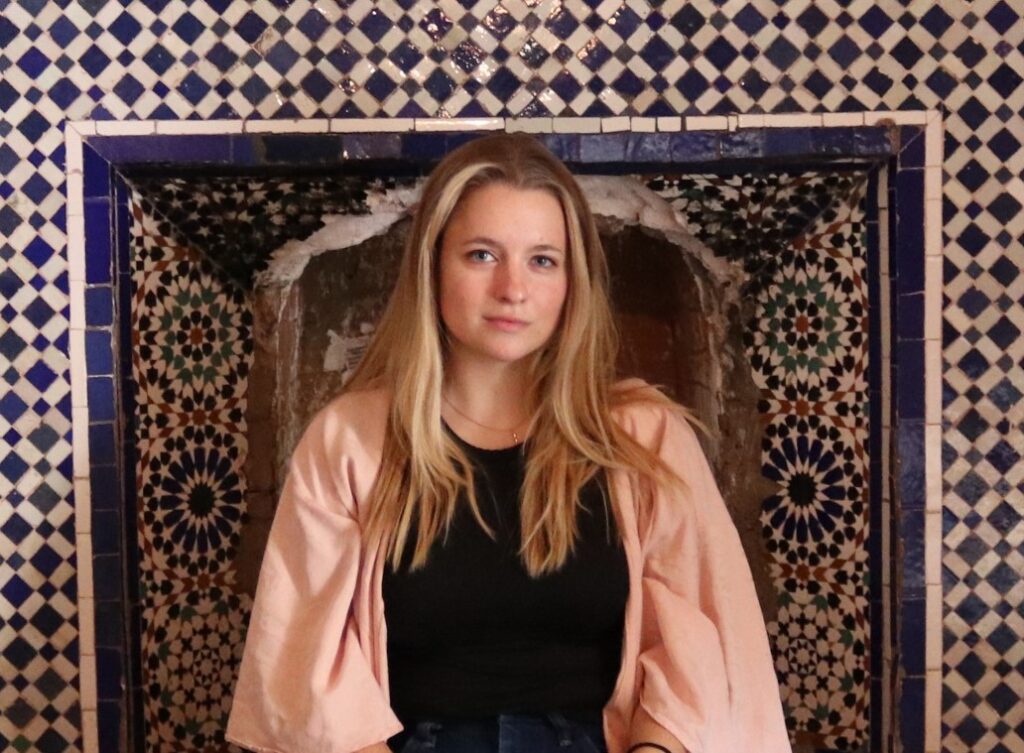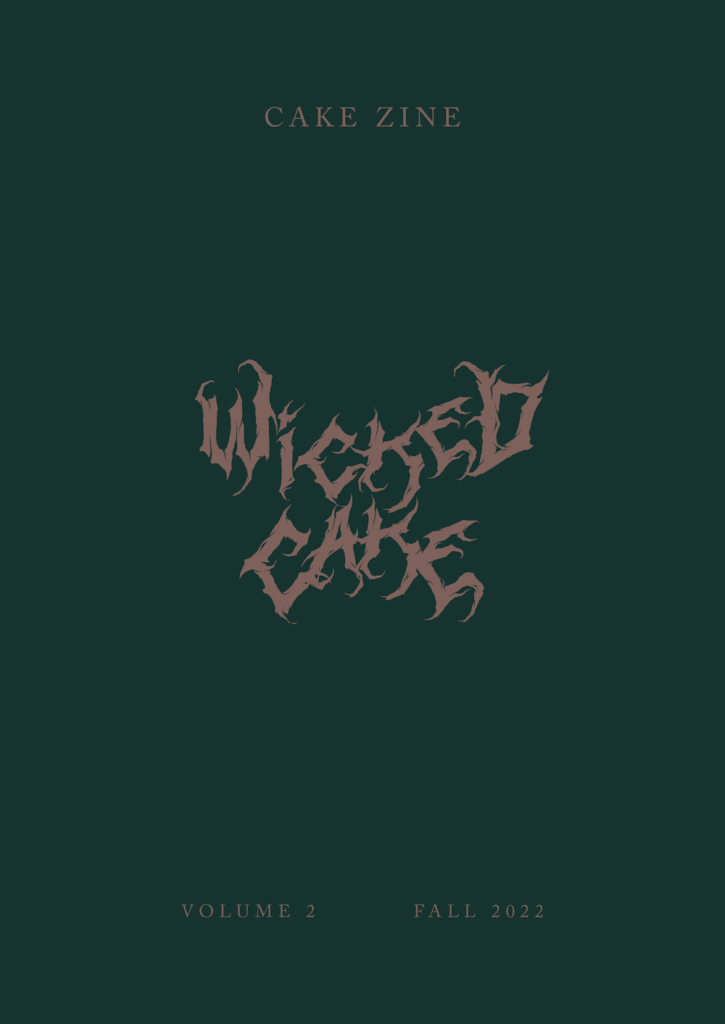The naughtiest release of the season is here. Tanya Bush and Aliza Abarbanel have launched Wicked Cake, the second issue of their self-described “hedonistic” publication, Cake Zine. While their first issue, Sexy Cake, was an examination of the sensualities, seductions, and heartbreaks of the eponymous dessert, this next iteration takes a pointed shift into the sinister machinations of cake.
Wicked Cake, like its sister issue, is a literary triumph, warping the boundaries of food writing into something fresh and provocative. There are recipes, sure—Death by Chocolate, anyone?—but the issue also includes essays, poems, and visual art that tackle murder, witches, diet culture, and AI all within the context of cake. Following Sexy Cake, which explored such realms as cake-sitting and historical implications of phallic cakes, Wicked Cake grounds itself as a darker foil to its playful predecessor.
Wicked Cake is the first issue that sourced contributors through an open pitch call, and includes works from Sohla El-Waylly, Bronwen Wyatt, Haruka Aoki, and many more. While Cake Zine recently announced this will be the last cake-centric issue of the zine (at least for now), the founders have no plans of slowing down; rather, they are ready to offer new sweet treats for your consumption in the future. Bush, a baker who rose to recognition through @will.this.make.me.happy, and Albarbanel, a food writer and contributing editor at TASTE, are not done pushing the boundaries of food writing, no matter how messy it gets.
Below is a conversation with the founders over a series of interviews which tackle societal norms, cake-to-the-face, and the production of Wicked Cake.
Madison Ford (The Inquisitive Eater): The next theme is Wicked Cake. What do you visualize for Wicked Cake and what is coming to light in the pitches that you didn’t expect from that theme?
Aliza Abarbanel: I would just say to start like Tanya and I are both twins—not together, separately. And the first two issues of Cake Zine are our fraternal twins as well. And maybe Wicked Cake is the evil twin to Sexy Cake. Or vice versa. To be determined.
Tanya Bush: TBD.
AA: We did kind of conceive of these issues at once and wanted to have a nice through line and also duality between the two of them. And I think Wicked was actually the first theme that we came up with. It just felt surprising and fun to talk about something like cake in a more dark context. And I know for us, and probably a lot of people around our age, the scene in Matilda with Bruce Bobtrotter devouring that entire cake is a very traumatizing scene in a book or movie of “wicked” cake. And once we started talking about that there was so many other things that came to light. Tanya is really interested in this history of cake as a vehicle for poisoning and cake as a murder weapon.
TB: There’s a lot of that. There’s all this folklore around you know, baking your enemies into cakes and then consuming them. There’s all these sort of really crazy, interesting tropes around the way that sin and cake and Devil’s Food Cake all sort of are coming together. There’s a lot that feels sort of intrinsically wicked about cakes specifically.
AA: In the imagination. And then also just looking at food systems and colonization and the sugar trade and the diet industry, these kind of more macro forces as well. So I think that’s all territory that definitely, based on the pitches we’ve received, will be covered in Wicked Cake, which is exciting.
How did this food writing project diverge from the type of food coverage each of you had done in the past? Of course, you both have backgrounds in food and food writing. Were there other publications that you took inspiration from? Or is this more like uncharted territory in the food writing space?
TB: I feel like there’s, in sort of larger glossy publications—you know, the Gourmets, the Bon Appetites of the world, the Food and Wines—there are sometimes personal essays that chefs or cooks will write. But I didn’t feel like there was really a forum in which all kinds of different artists, makers, creators could sort of converge around a topic and use their experience to take it on in a particular way. I was thinking a lot about how history, literature and art are so entwined with food and the way that we think about food, and a really interesting access point for the layperson. So I think that I didn’t really see much of that out there. But it felt like just sort of an obvious thing to me. And then obviously, as a baker, I think a lot about cake, and I eat a lot of dessert and it felt to me like—you know, it’s really very much like the last bite at the end of a meal and people often don’t take—it’s not often carefully considered, the history and culture surrounding desert. And so it felt to me like that was a fun and engaging access point.
AA: Yeah. I think desert is such a good vehicle to talk about significance, because it’s not necessary for anyone’s survival, right? It’s inherently something that people are using to bring extra meaning into something. So I do have a food media and a media background in general. But I honestly don’t bake that often, or particularly love cake compared to other desserts even. But when Tanya presented it as the focus, I thought it was just such a rich subject material. And I would say that I don’t really think there’s a one to one to what we’re doing. But there are definitely other things in food media, whether it’s the Vittles newsletter that’s based out of the UK—I think they do really great work talking about the history of different dishes. And it’s definitely something that I admire. I feel like the “Short Stack” cookbook series that is focused on pancakes or soup or a specific kind of dish is a good through line as well. And beyond that, I don’t know, I’m interested to see. I think Wicked Cake, we want to bring in formats that we haven’t done previously.
I’ll say that when I was in high school, I was definitely dousing myself in Victoria’s Secret perfumes that were like “vanilla body birthday cake.”
Something that was really interesting in Sexy Cake: I kind of saw this correlation with a coming-of-age developmental stage of sexuality of people in their teens and early twenties. A lot of the stories and essays were harkening back to the time when people’s lives—like the “Eau de Cake”(Nicolaia Rips) and “I Made You Something” (Sanaë Lemoine) and I think there was a teenage portrait too. What do you think there is between cake and burgeoning sexuality? Did you expect there to be a lot in that age range of essays when you first called for this subject matter?
TB: I mean, I’ll say that when I was in high school, I was definitely dousing myself in Victoria’s Secret perfumes that were like “vanilla body birthday cake.” Nicolaia writes about this in her piece: fashioning yourself into sort of a consumable dessert felt like a pretty obvious and relatable experience for a lot of people. It’s interesting that to your point with “Teenage Nightmare,” Tatiana Dubin’s piece, there are harrowing experiences that come about in the context of cake and burgeoning sexuality. And then also more sort of flirty, playful, “I’m trying to date SpiderMan.”
AA: I think also, to be a little critical of the scope of our first issue, I think all the contributors were around a certain age range where talking about burgeoning sexuality is relatively recent, and nostalgic and funny. And also our audience definitely has a lot of people in their late twenties, early thirties. So I think talking about nostalgia is something people are always interested in talking about. And you can maybe laugh at yourself at this point in time. So I think that naturally t kind of led to teenage sexuality being talked about. But I also think that, you know, everyone loves talking about teenage sexuality. That’s why PEN15 and Big Mouth and all of those shows, the high school TV show, will eternally be relevant because everyone has had that experience. And of trying to attract somebody and thinking that a body wash that you bought at the strip mall is going to be the way to do it.
Speaking of humor, there was such a great level of humor in Sexy Cake. It felt more like an undercurrent to it. Do you think the tone of Sexy Cake is going to sort of permeate throughout the rest of the volumes? Or do you see each one kind of having its own tone?
TB: It’s something we’re asking ourselves right now, because a lot of the types of pitches that we got for Wicked are obviously more macabre and dark, and there’s cake as a metaphor for empire. And there’s a lot of just darker shit that comes about with a wicked theme. So I think that trying to figure out how to balance that. We don’t want to take ourselves too seriously. This is ultimately a publication about cake. At least for now, and dessert. But also every issue is going to have its atmosphere and tone. And I think that, while we’re going to have levity as a part—because there’s some just totally crazy weird stuff that is kind of hilarious, in the context of “wicked” cake and sin eating and all of that—I think that we have to sort of honor that each issue is going to stand alone in terms of tone and format and content.
AA: I feel like it’s like a “yes, and” situation, where obviously you don’t want to read a whole magazine that’s everything is really dark and depressing. And there is a lot of humor, I think, that can be found in Wicked. Whether it’s something that was originally viewed as wicked, that now we would not think of that way, such as women eating full fat desserts, or a horror story, something like that. But at the same time, I think that the beauty of this premise is that it is making you think about something like cake that maybe you don’t think about in a darker context in that way. And as something I’m sure you think about with food: food is not just something we do for pleasure, right? It’s linked to all of these major systems like labor and capitalism and advertising.
I do think one of the most wicked things you can do with cake is smash it into your partner’s face in front of everyone.
While I’m reading Sexy Cake, I was thinking about the wedding ritual of people feeding each other cake. And how oftentimes people kind of turn it into the comedic thing where they wipe it on their partner. They make it messy. When originally it was kind of this sensual exchange. I thought of the individuals you’ll see who, when it gets messy, they’re almost a little upset by it. They don’t love the fact that their partner decided to go comedic. It made me think about that more in the context of cake as a sexual, sensual symbol in our lives. Do you have any thoughts on the wedding cake ritual? Do you think the sensuality of cake has to do with how people choose to go about it?
AA: In Lexie Smith’s essay “The Phallus Fallacy,” she talks a little bit about the kind of significance of the Western wedding cake as the artifice of virginity for the bride specifically, and that everyone watches you cut into it. And that’s like the cake being deflowered kind of in the same way that there’s the garter ritual at some weddings or things like that. So I think I see couples, and I assume we’re talking about, or maybe I shouldn’t assume, but straight couples specifically, making a joke about the smashing because maybe they’re uncomfortable with the significance of the wedding contract and the bride’s virginity. Or they don’t like the attention in that way. But I do think one of the most wicked things you can do with cake is smash it into your partner’s face in front of everyone. If they didn’t want it, especially if it’s the bride who spent hours getting ready and putting on makeup and, you know, becoming this artifice of what femininity is—and then having the cake smashed in your face and ruining all that makeup? That’s not something I would fuck with.
TB: No, but it’s an amazing photo op. It’s literally all about the photo op, isn’t it?
AA: But it’s like “haha, we’re not like other couples.
TB: “Yeah, we’re so fun and flirty.”
AA: “We’re just getting legally married, haha.”
TB: We received a couple pitches about the potential wickedness of cake smashed in the face. And that’s a whole sort of genre of content out there.
Something I was thinking about since I talked to you last, and with the announcement, I feel like there’s this societal sentiment about eating cake that kind of runs along the lines of “It’s so bad.” Like: “I had two slices, I’m so bad,” or “Should I be bad and order dessert?” etc., etc. How do you think this issue of Cake Zine kind of confronts or unravels the “badness” of eating cake?
AA: I’m so glad you mentioned that, because that obviously is something that we were thinking about a lot. I think the most obvious connection in this issue is that there’s a historian KC Hysmith that wrote a piece for us about SnackWell’s. Their tagline is “be bad, snack well.” So it was very much like a marketing mechanism rooted in the idea of categorizing, you know, “most desserts are terrible for you, but this low fat line”—which was being marketed towards women in the 90s and 2000s—“this is the good version.” And this historian does a really great job of talking about the history of moralizing desserts in America. And it connects back to [Sylvester] Graham who invented graham crackers. He was basically like a dietary reformer, who thought that refined flour and sugar would lead to masturbation, which he thought was a bad thing. So he created graham crackers from this very whole grain flour. Basically a way to keep you on the straight and narrow and not be eating tempting flours that could lead you towards untoward behavior. So that piece is kind of looking very far back and then also talking about this more present day mechanism of the way that desserts have been moralized.
Maybe it’s not actually “bad” but it’s just outside of the norm or debauched in some kind of way.
We’re living in an interesting time when it comes to relationships to food, because I think so many adults now lived through some sort of societal upbringing that was kind of rooted in disordered eating. And people are trying to unravel that to some degree. And so now, it’s like we’re all kind of tiptoeing back to what our relationships with “bad foods” can look like. And it’s interesting having literature to explore that as well, which is kind of what you guys are doing.
AA: We spent a lot of time talking about what the title for the issue would be, and I think that wicked is the word we landed on as opposed to evil or even bad or something like that, because it kind of has all these meanings behind it. Like wicked can be a wicked grin that has some joy behind it, or wicked can be something being categorized as evil like witchcraft or ghosts. Maybe it’s not actually “bad” but it’s just outside of the norm or debauched in some kind of way. So I think that we are drawn to ambiguity in that term.
Following Sexy Cake with Wicked Cake, is there some sort of specific sentiment or reading experience you want readers to take away that differs from the first issue?
AA: I think the larger goal of inspiring people to look at something like cake or food in general and think about it in different historical or cultural or personal contexts remains the same for sure. And I think that like some of the larger themes in terms of challenging mainstream conceptions of things or certainly diet culture or gender roles in society, like patriarchal norms, things like that. I think those kind of remain constant but you know, obviously I hope people will be a little scared reading this issue. We very much tried to make an issue that felt appropriate for this kind of darker, internal time of year.
Well, I’m excited to grab a copy and hopefully it does not completely haunt my space…

In celebration of its release, Wicked Cake is having a launch party hosted at Farm to People in Brooklyn on November 10, open to the public. The issue is available now for pre-order.

Madison Ford is a Brooklyn-based writer and actor. She is the Editor-in-Chief of The New School’s food writing publication, The Inquisitive Eater, and her work has been published in Texas Monthly, The Brooklyn Rail, Architectural Digest, and Dujour. She is currently pursuing her MFA in Creative Writing at The New School.


Comments are closed.